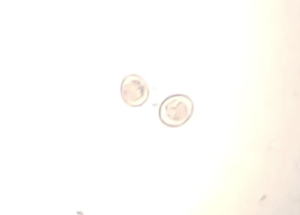Coccidia
What are coccidia?
 Coccidia are small protozoans (one-celled organisms) that multiply in the intestinal tracts of dogs and cats, most commonly in kittens and puppies less than six months of age. Coccidia can be seen in adult animals as well, especially if they are stressed. As an animal ages it tends to develop a natural immunity to the effects of coccidia. An adult may carry coccidia in its intestines, shed the cyst in the feces, but experience no ill effects.
Coccidia are small protozoans (one-celled organisms) that multiply in the intestinal tracts of dogs and cats, most commonly in kittens and puppies less than six months of age. Coccidia can be seen in adult animals as well, especially if they are stressed. As an animal ages it tends to develop a natural immunity to the effects of coccidia. An adult may carry coccidia in its intestines, shed the cyst in the feces, but experience no ill effects.
How are coccidia transmitted?
The coccida organisms are shed in feces and live in the environment for long periods of time. From exposure to the coccidia in feces to the onset of the illness is about 13 days. Most animals who are ill from coccidia are, therefore, two weeks of age and older. Infections are common in shelters and breeding facilities.
What are the symptoms of coccidiosis?
The primary sign of an animal suffering with coccidiosis is diarrhea. The diarrhea may be mild to severe depending on the level of infection. Blood and mucous may be present, especially in advanced cases. Severely affected animals may also vomit, lose their appetite, become dehydrated, and in some instances, die from the disease. A microscopic fecal exam by a veterinarian will detect the cysts confirming a diagnosis.
What is the treatment of coccidiosis?
There are a few antibiotics that treat coccidia. They should generally be used for at least 10 days. Because these drugs do not kill the organisms, but rather inhibit their reproduction capabilities, elimination of coccidia from the intestine is not rapid. By stopping the ability of the protozoa to reproduce, time is allowed for the puppy's own immunity to develop and remove the organisms.
Stress does play a role in the development of coccidiosis, so it is not uncommon to need extended treatment after a stressful event (arriving at a new home, visiting the vets office.)
How is coccidiosis prevented or controlled?
Because coccidia is spread by the feces of carrier animals, it is very important to practice strict sanitation. All fecal material should be removed. Housing needs to be such that food and water cannot become contaminated with feces. Clean water should be provided at all times. Most disinfectants do not work well against coccidia; incineration of the feces, and steam cleaning, immersion in boiling water or a 10% ammonia solution are the best methods to kill coccidia. Coccidia can withstand freezing.
Coccidia are very species specific. They cannot pass to people and dog coccidia cannot infect cats, nor can cat coccidia infect dogs.
Cookies on this website are used to both support the function and performance of the site, and also for marketing purposes, including personalizing content and tailoring advertising to your interests. To manage marketing cookies on this website, please select the button that indicates your preferences. More information can be found in our privacy policy here.


